Critical Analysis of Democracy, Human Rights, and Social Values
VerifiedAdded on 2021/02/20
|8
|2653
|32
Report
AI Summary
This report critically analyzes the implications of democracy on human rights, individual freedom, and social values, based on a case study examining whether democracy is overrated. It explores the purposes of critical thinking in evaluating the positive and negative impacts of democracy, including how it shapes individual perceptions and promotes creative problem-solving. The report demonstrates an understanding of critical thinking skills by examining claims about democracy's role in protecting human rights and political stability, and how political leaders can misuse their power. It evaluates the case study's arguments regarding the relationship between democracy, human rights, and individual freedom, concluding that while democracy has advantages, it is not without its flaws. The report highlights the importance of ethical political leadership and the need for democratic systems that protect human rights and individual freedoms. The report is a valuable resource for students seeking to enhance their understanding of political science and critical thinking.
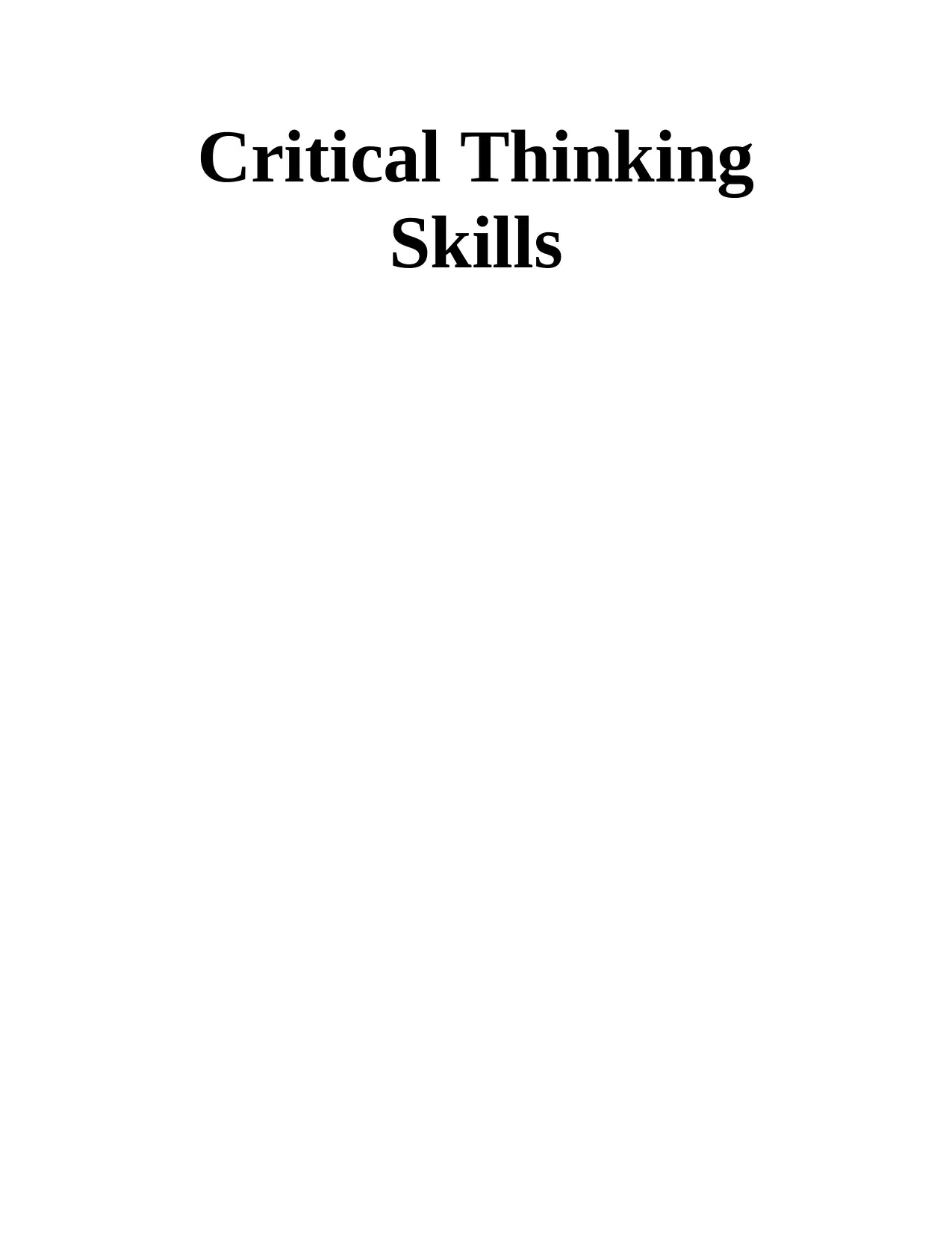
Critical Thinking
Skills
Skills
Paraphrase This Document
Need a fresh take? Get an instant paraphrase of this document with our AI Paraphraser
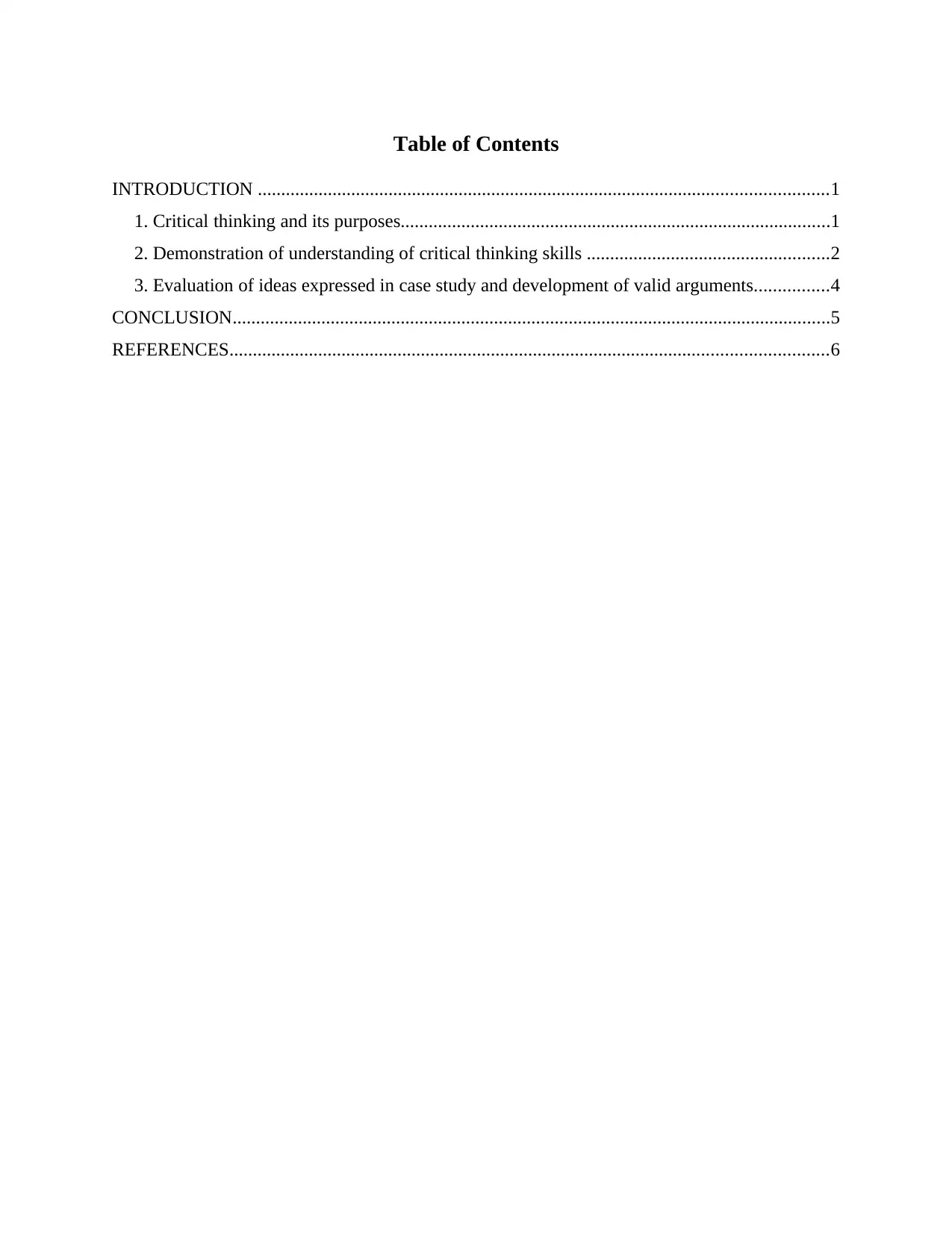
Table of Contents
INTRODUCTION ..........................................................................................................................1
1. Critical thinking and its purposes............................................................................................1
2. Demonstration of understanding of critical thinking skills ....................................................2
3. Evaluation of ideas expressed in case study and development of valid arguments................4
CONCLUSION................................................................................................................................5
REFERENCES................................................................................................................................6
INTRODUCTION ..........................................................................................................................1
1. Critical thinking and its purposes............................................................................................1
2. Demonstration of understanding of critical thinking skills ....................................................2
3. Evaluation of ideas expressed in case study and development of valid arguments................4
CONCLUSION................................................................................................................................5
REFERENCES................................................................................................................................6
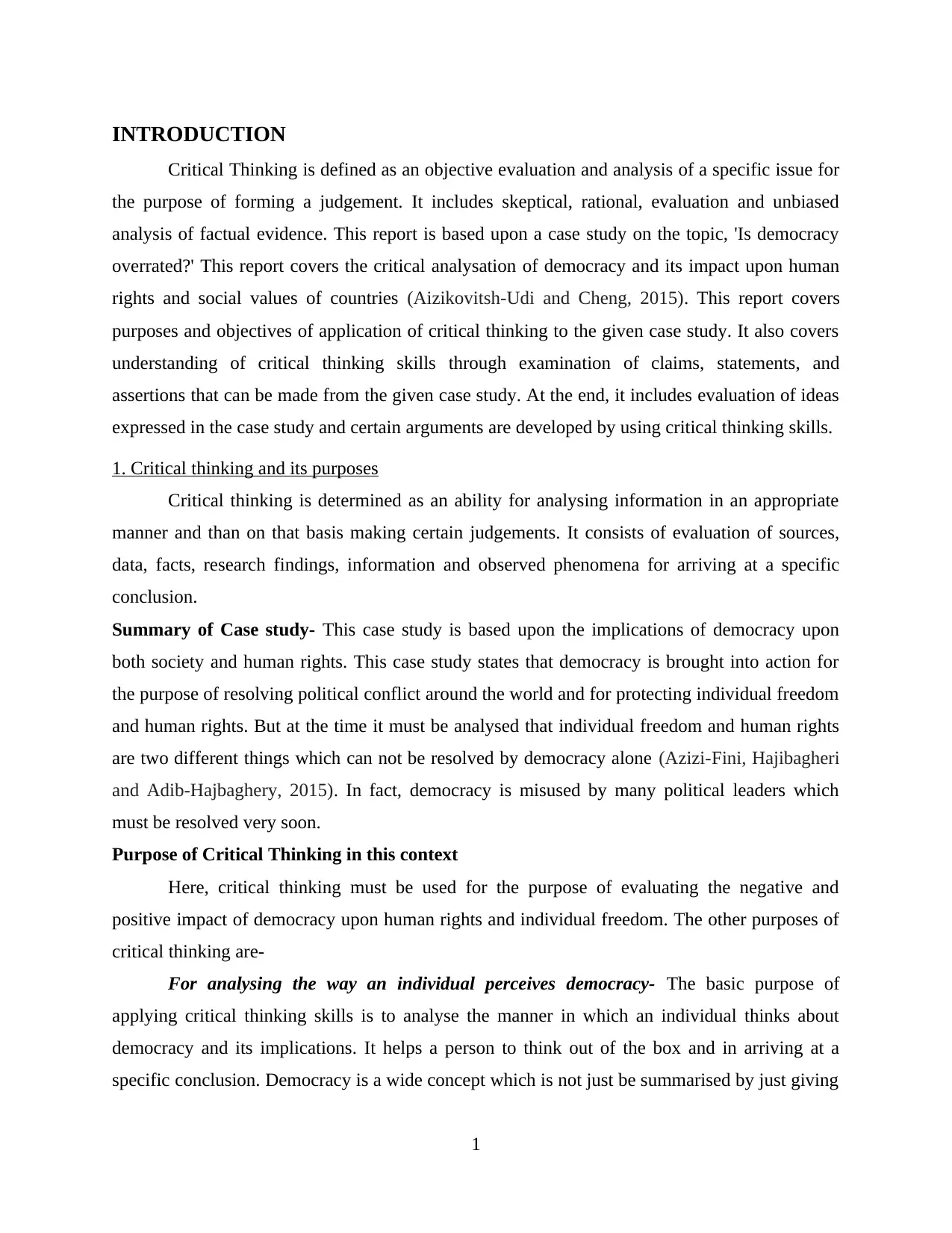
INTRODUCTION
Critical Thinking is defined as an objective evaluation and analysis of a specific issue for
the purpose of forming a judgement. It includes skeptical, rational, evaluation and unbiased
analysis of factual evidence. This report is based upon a case study on the topic, 'Is democracy
overrated?' This report covers the critical analysation of democracy and its impact upon human
rights and social values of countries (Aizikovitsh-Udi and Cheng, 2015). This report covers
purposes and objectives of application of critical thinking to the given case study. It also covers
understanding of critical thinking skills through examination of claims, statements, and
assertions that can be made from the given case study. At the end, it includes evaluation of ideas
expressed in the case study and certain arguments are developed by using critical thinking skills.
1. Critical thinking and its purposes
Critical thinking is determined as an ability for analysing information in an appropriate
manner and than on that basis making certain judgements. It consists of evaluation of sources,
data, facts, research findings, information and observed phenomena for arriving at a specific
conclusion.
Summary of Case study- This case study is based upon the implications of democracy upon
both society and human rights. This case study states that democracy is brought into action for
the purpose of resolving political conflict around the world and for protecting individual freedom
and human rights. But at the time it must be analysed that individual freedom and human rights
are two different things which can not be resolved by democracy alone (Azizi-Fini, Hajibagheri
and Adib-Hajbaghery, 2015). In fact, democracy is misused by many political leaders which
must be resolved very soon.
Purpose of Critical Thinking in this context
Here, critical thinking must be used for the purpose of evaluating the negative and
positive impact of democracy upon human rights and individual freedom. The other purposes of
critical thinking are-
For analysing the way an individual perceives democracy- The basic purpose of
applying critical thinking skills is to analyse the manner in which an individual thinks about
democracy and its implications. It helps a person to think out of the box and in arriving at a
specific conclusion. Democracy is a wide concept which is not just be summarised by just giving
1
Critical Thinking is defined as an objective evaluation and analysis of a specific issue for
the purpose of forming a judgement. It includes skeptical, rational, evaluation and unbiased
analysis of factual evidence. This report is based upon a case study on the topic, 'Is democracy
overrated?' This report covers the critical analysation of democracy and its impact upon human
rights and social values of countries (Aizikovitsh-Udi and Cheng, 2015). This report covers
purposes and objectives of application of critical thinking to the given case study. It also covers
understanding of critical thinking skills through examination of claims, statements, and
assertions that can be made from the given case study. At the end, it includes evaluation of ideas
expressed in the case study and certain arguments are developed by using critical thinking skills.
1. Critical thinking and its purposes
Critical thinking is determined as an ability for analysing information in an appropriate
manner and than on that basis making certain judgements. It consists of evaluation of sources,
data, facts, research findings, information and observed phenomena for arriving at a specific
conclusion.
Summary of Case study- This case study is based upon the implications of democracy upon
both society and human rights. This case study states that democracy is brought into action for
the purpose of resolving political conflict around the world and for protecting individual freedom
and human rights. But at the time it must be analysed that individual freedom and human rights
are two different things which can not be resolved by democracy alone (Azizi-Fini, Hajibagheri
and Adib-Hajbaghery, 2015). In fact, democracy is misused by many political leaders which
must be resolved very soon.
Purpose of Critical Thinking in this context
Here, critical thinking must be used for the purpose of evaluating the negative and
positive impact of democracy upon human rights and individual freedom. The other purposes of
critical thinking are-
For analysing the way an individual perceives democracy- The basic purpose of
applying critical thinking skills is to analyse the manner in which an individual thinks about
democracy and its implications. It helps a person to think out of the box and in arriving at a
specific conclusion. Democracy is a wide concept which is not just be summarised by just giving
1
⊘ This is a preview!⊘
Do you want full access?
Subscribe today to unlock all pages.

Trusted by 1+ million students worldwide
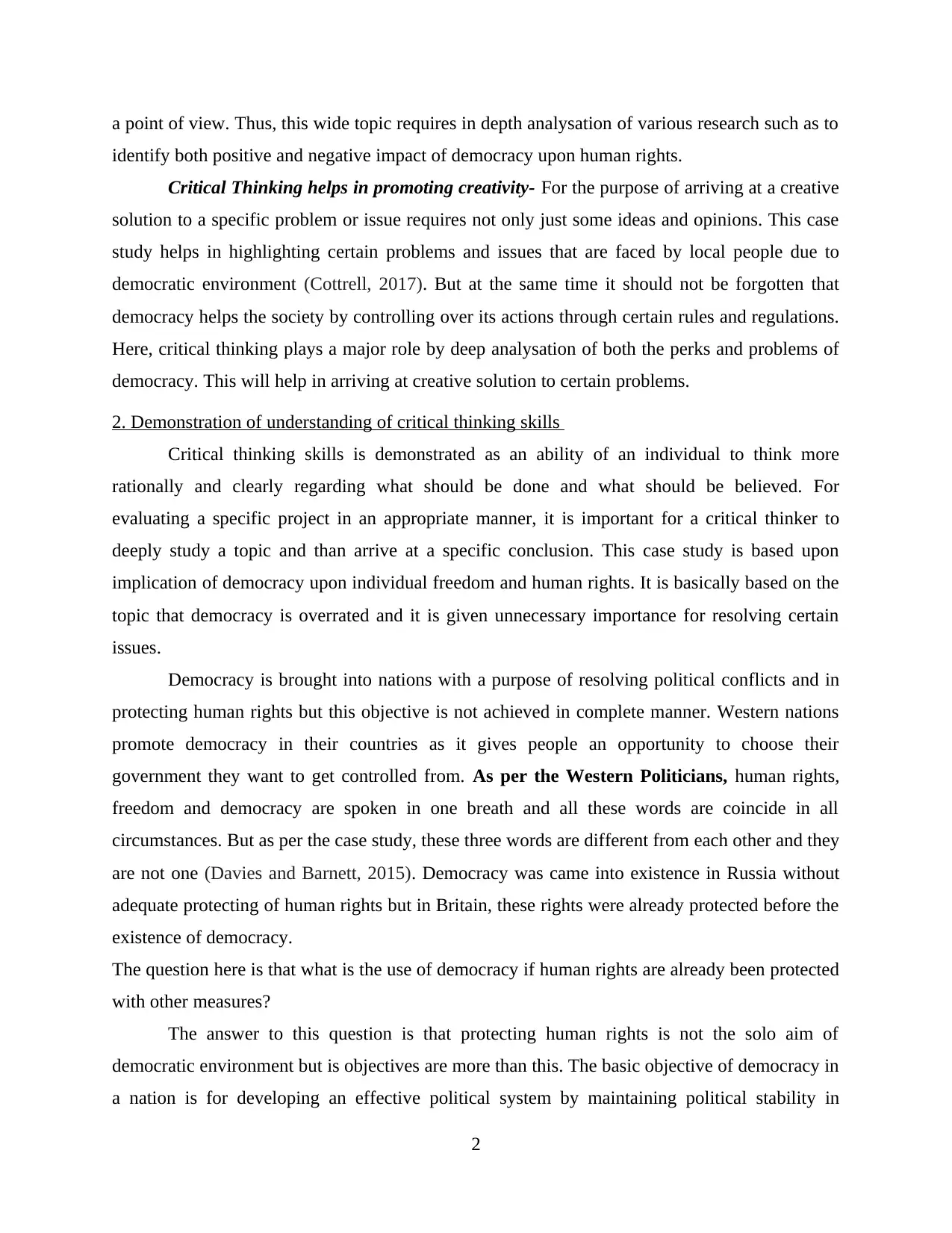
a point of view. Thus, this wide topic requires in depth analysation of various research such as to
identify both positive and negative impact of democracy upon human rights.
Critical Thinking helps in promoting creativity- For the purpose of arriving at a creative
solution to a specific problem or issue requires not only just some ideas and opinions. This case
study helps in highlighting certain problems and issues that are faced by local people due to
democratic environment (Cottrell, 2017). But at the same time it should not be forgotten that
democracy helps the society by controlling over its actions through certain rules and regulations.
Here, critical thinking plays a major role by deep analysation of both the perks and problems of
democracy. This will help in arriving at creative solution to certain problems.
2. Demonstration of understanding of critical thinking skills
Critical thinking skills is demonstrated as an ability of an individual to think more
rationally and clearly regarding what should be done and what should be believed. For
evaluating a specific project in an appropriate manner, it is important for a critical thinker to
deeply study a topic and than arrive at a specific conclusion. This case study is based upon
implication of democracy upon individual freedom and human rights. It is basically based on the
topic that democracy is overrated and it is given unnecessary importance for resolving certain
issues.
Democracy is brought into nations with a purpose of resolving political conflicts and in
protecting human rights but this objective is not achieved in complete manner. Western nations
promote democracy in their countries as it gives people an opportunity to choose their
government they want to get controlled from. As per the Western Politicians, human rights,
freedom and democracy are spoken in one breath and all these words are coincide in all
circumstances. But as per the case study, these three words are different from each other and they
are not one (Davies and Barnett, 2015). Democracy was came into existence in Russia without
adequate protecting of human rights but in Britain, these rights were already protected before the
existence of democracy.
The question here is that what is the use of democracy if human rights are already been protected
with other measures?
The answer to this question is that protecting human rights is not the solo aim of
democratic environment but is objectives are more than this. The basic objective of democracy in
a nation is for developing an effective political system by maintaining political stability in
2
identify both positive and negative impact of democracy upon human rights.
Critical Thinking helps in promoting creativity- For the purpose of arriving at a creative
solution to a specific problem or issue requires not only just some ideas and opinions. This case
study helps in highlighting certain problems and issues that are faced by local people due to
democratic environment (Cottrell, 2017). But at the same time it should not be forgotten that
democracy helps the society by controlling over its actions through certain rules and regulations.
Here, critical thinking plays a major role by deep analysation of both the perks and problems of
democracy. This will help in arriving at creative solution to certain problems.
2. Demonstration of understanding of critical thinking skills
Critical thinking skills is demonstrated as an ability of an individual to think more
rationally and clearly regarding what should be done and what should be believed. For
evaluating a specific project in an appropriate manner, it is important for a critical thinker to
deeply study a topic and than arrive at a specific conclusion. This case study is based upon
implication of democracy upon individual freedom and human rights. It is basically based on the
topic that democracy is overrated and it is given unnecessary importance for resolving certain
issues.
Democracy is brought into nations with a purpose of resolving political conflicts and in
protecting human rights but this objective is not achieved in complete manner. Western nations
promote democracy in their countries as it gives people an opportunity to choose their
government they want to get controlled from. As per the Western Politicians, human rights,
freedom and democracy are spoken in one breath and all these words are coincide in all
circumstances. But as per the case study, these three words are different from each other and they
are not one (Davies and Barnett, 2015). Democracy was came into existence in Russia without
adequate protecting of human rights but in Britain, these rights were already protected before the
existence of democracy.
The question here is that what is the use of democracy if human rights are already been protected
with other measures?
The answer to this question is that protecting human rights is not the solo aim of
democratic environment but is objectives are more than this. The basic objective of democracy in
a nation is for developing an effective political system by maintaining political stability in
2
Paraphrase This Document
Need a fresh take? Get an instant paraphrase of this document with our AI Paraphraser
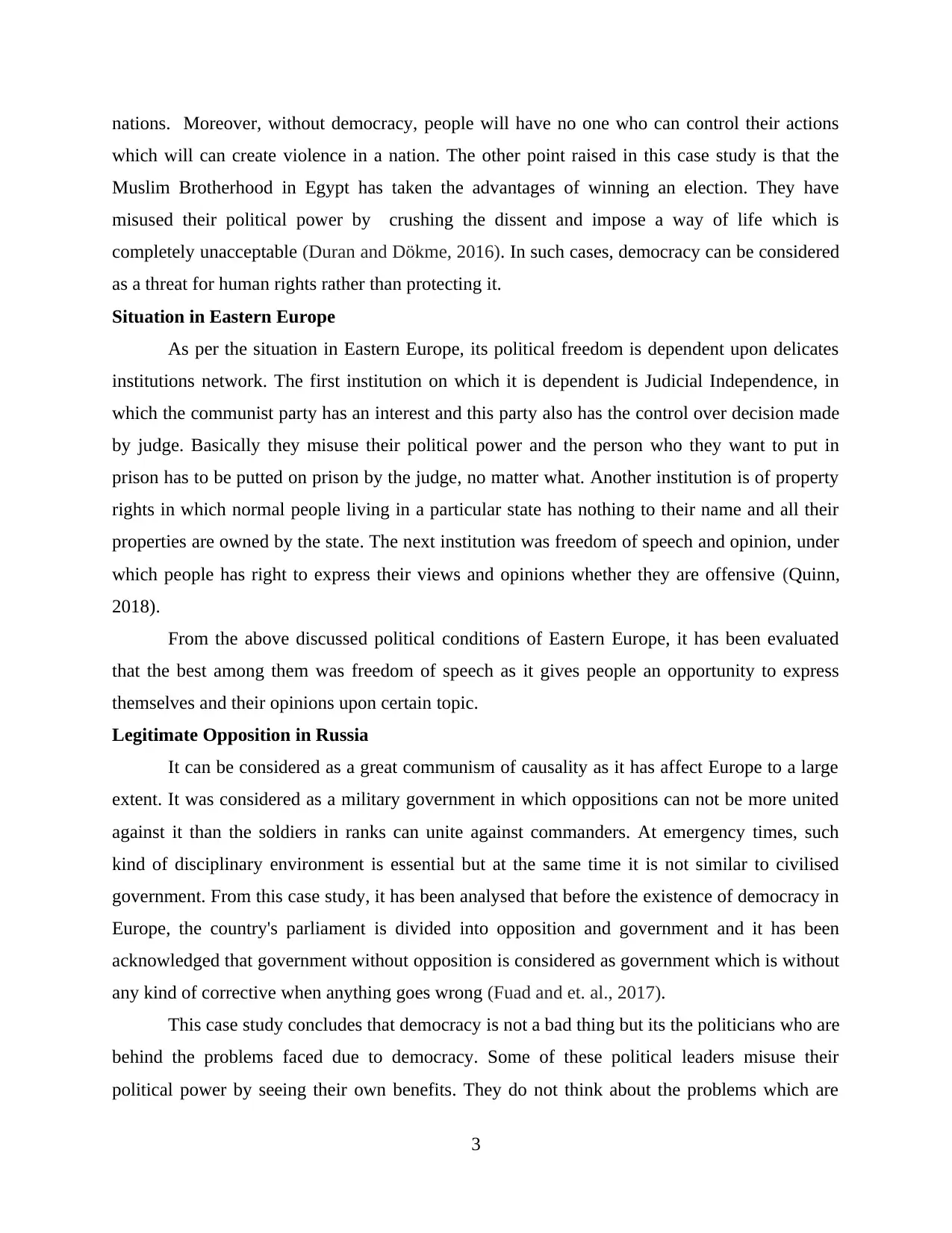
nations. Moreover, without democracy, people will have no one who can control their actions
which will can create violence in a nation. The other point raised in this case study is that the
Muslim Brotherhood in Egypt has taken the advantages of winning an election. They have
misused their political power by crushing the dissent and impose a way of life which is
completely unacceptable (Duran and Dökme, 2016). In such cases, democracy can be considered
as a threat for human rights rather than protecting it.
Situation in Eastern Europe
As per the situation in Eastern Europe, its political freedom is dependent upon delicates
institutions network. The first institution on which it is dependent is Judicial Independence, in
which the communist party has an interest and this party also has the control over decision made
by judge. Basically they misuse their political power and the person who they want to put in
prison has to be putted on prison by the judge, no matter what. Another institution is of property
rights in which normal people living in a particular state has nothing to their name and all their
properties are owned by the state. The next institution was freedom of speech and opinion, under
which people has right to express their views and opinions whether they are offensive (Quinn,
2018).
From the above discussed political conditions of Eastern Europe, it has been evaluated
that the best among them was freedom of speech as it gives people an opportunity to express
themselves and their opinions upon certain topic.
Legitimate Opposition in Russia
It can be considered as a great communism of causality as it has affect Europe to a large
extent. It was considered as a military government in which oppositions can not be more united
against it than the soldiers in ranks can unite against commanders. At emergency times, such
kind of disciplinary environment is essential but at the same time it is not similar to civilised
government. From this case study, it has been analysed that before the existence of democracy in
Europe, the country's parliament is divided into opposition and government and it has been
acknowledged that government without opposition is considered as government which is without
any kind of corrective when anything goes wrong (Fuad and et. al., 2017).
This case study concludes that democracy is not a bad thing but its the politicians who are
behind the problems faced due to democracy. Some of these political leaders misuse their
political power by seeing their own benefits. They do not think about the problems which are
3
which will can create violence in a nation. The other point raised in this case study is that the
Muslim Brotherhood in Egypt has taken the advantages of winning an election. They have
misused their political power by crushing the dissent and impose a way of life which is
completely unacceptable (Duran and Dökme, 2016). In such cases, democracy can be considered
as a threat for human rights rather than protecting it.
Situation in Eastern Europe
As per the situation in Eastern Europe, its political freedom is dependent upon delicates
institutions network. The first institution on which it is dependent is Judicial Independence, in
which the communist party has an interest and this party also has the control over decision made
by judge. Basically they misuse their political power and the person who they want to put in
prison has to be putted on prison by the judge, no matter what. Another institution is of property
rights in which normal people living in a particular state has nothing to their name and all their
properties are owned by the state. The next institution was freedom of speech and opinion, under
which people has right to express their views and opinions whether they are offensive (Quinn,
2018).
From the above discussed political conditions of Eastern Europe, it has been evaluated
that the best among them was freedom of speech as it gives people an opportunity to express
themselves and their opinions upon certain topic.
Legitimate Opposition in Russia
It can be considered as a great communism of causality as it has affect Europe to a large
extent. It was considered as a military government in which oppositions can not be more united
against it than the soldiers in ranks can unite against commanders. At emergency times, such
kind of disciplinary environment is essential but at the same time it is not similar to civilised
government. From this case study, it has been analysed that before the existence of democracy in
Europe, the country's parliament is divided into opposition and government and it has been
acknowledged that government without opposition is considered as government which is without
any kind of corrective when anything goes wrong (Fuad and et. al., 2017).
This case study concludes that democracy is not a bad thing but its the politicians who are
behind the problems faced due to democracy. Some of these political leaders misuse their
political power by seeing their own benefits. They do not think about the problems which are
3
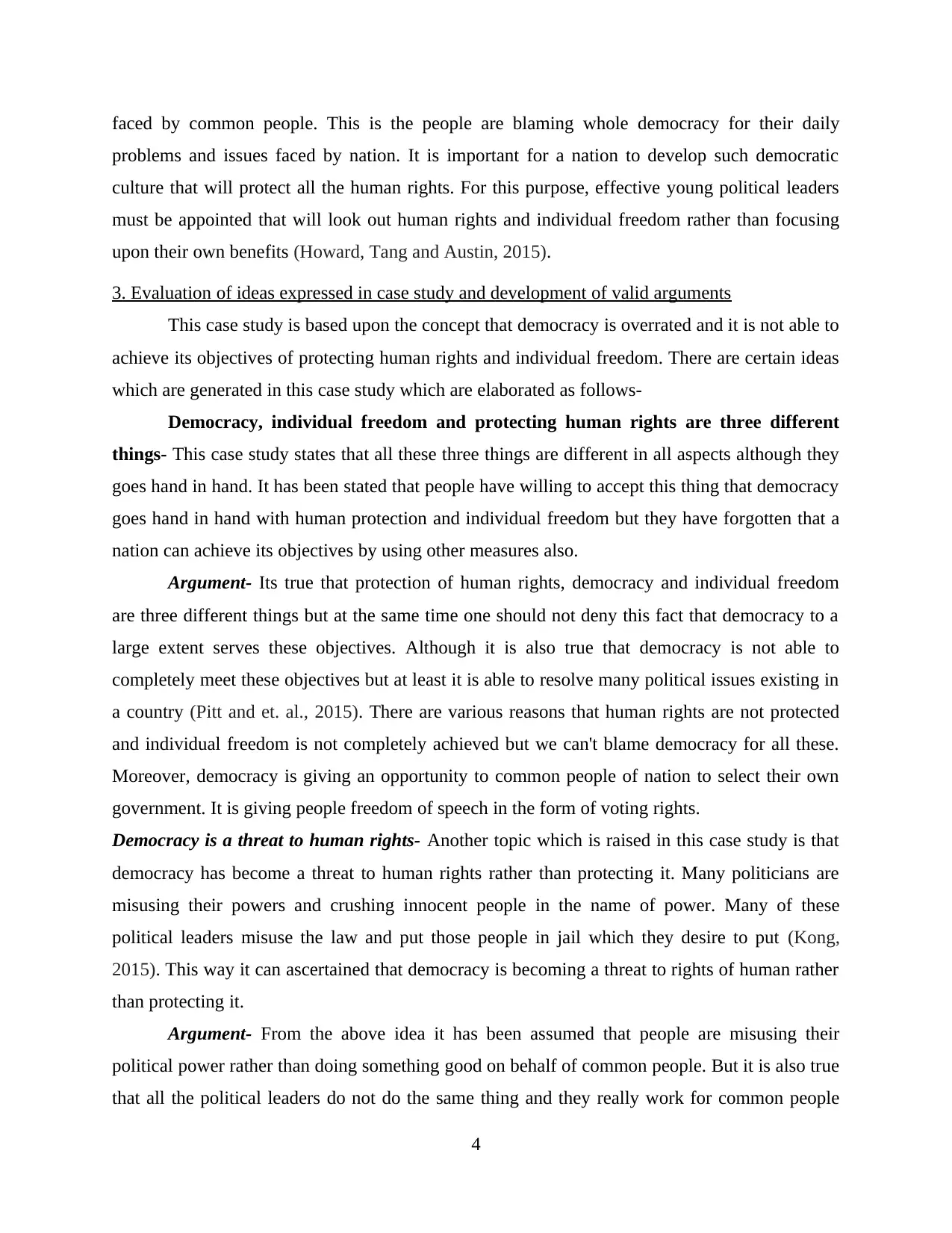
faced by common people. This is the people are blaming whole democracy for their daily
problems and issues faced by nation. It is important for a nation to develop such democratic
culture that will protect all the human rights. For this purpose, effective young political leaders
must be appointed that will look out human rights and individual freedom rather than focusing
upon their own benefits (Howard, Tang and Austin, 2015).
3. Evaluation of ideas expressed in case study and development of valid arguments
This case study is based upon the concept that democracy is overrated and it is not able to
achieve its objectives of protecting human rights and individual freedom. There are certain ideas
which are generated in this case study which are elaborated as follows-
Democracy, individual freedom and protecting human rights are three different
things- This case study states that all these three things are different in all aspects although they
goes hand in hand. It has been stated that people have willing to accept this thing that democracy
goes hand in hand with human protection and individual freedom but they have forgotten that a
nation can achieve its objectives by using other measures also.
Argument- Its true that protection of human rights, democracy and individual freedom
are three different things but at the same time one should not deny this fact that democracy to a
large extent serves these objectives. Although it is also true that democracy is not able to
completely meet these objectives but at least it is able to resolve many political issues existing in
a country (Pitt and et. al., 2015). There are various reasons that human rights are not protected
and individual freedom is not completely achieved but we can't blame democracy for all these.
Moreover, democracy is giving an opportunity to common people of nation to select their own
government. It is giving people freedom of speech in the form of voting rights.
Democracy is a threat to human rights- Another topic which is raised in this case study is that
democracy has become a threat to human rights rather than protecting it. Many politicians are
misusing their powers and crushing innocent people in the name of power. Many of these
political leaders misuse the law and put those people in jail which they desire to put (Kong,
2015). This way it can ascertained that democracy is becoming a threat to rights of human rather
than protecting it.
Argument- From the above idea it has been assumed that people are misusing their
political power rather than doing something good on behalf of common people. But it is also true
that all the political leaders do not do the same thing and they really work for common people
4
problems and issues faced by nation. It is important for a nation to develop such democratic
culture that will protect all the human rights. For this purpose, effective young political leaders
must be appointed that will look out human rights and individual freedom rather than focusing
upon their own benefits (Howard, Tang and Austin, 2015).
3. Evaluation of ideas expressed in case study and development of valid arguments
This case study is based upon the concept that democracy is overrated and it is not able to
achieve its objectives of protecting human rights and individual freedom. There are certain ideas
which are generated in this case study which are elaborated as follows-
Democracy, individual freedom and protecting human rights are three different
things- This case study states that all these three things are different in all aspects although they
goes hand in hand. It has been stated that people have willing to accept this thing that democracy
goes hand in hand with human protection and individual freedom but they have forgotten that a
nation can achieve its objectives by using other measures also.
Argument- Its true that protection of human rights, democracy and individual freedom
are three different things but at the same time one should not deny this fact that democracy to a
large extent serves these objectives. Although it is also true that democracy is not able to
completely meet these objectives but at least it is able to resolve many political issues existing in
a country (Pitt and et. al., 2015). There are various reasons that human rights are not protected
and individual freedom is not completely achieved but we can't blame democracy for all these.
Moreover, democracy is giving an opportunity to common people of nation to select their own
government. It is giving people freedom of speech in the form of voting rights.
Democracy is a threat to human rights- Another topic which is raised in this case study is that
democracy has become a threat to human rights rather than protecting it. Many politicians are
misusing their powers and crushing innocent people in the name of power. Many of these
political leaders misuse the law and put those people in jail which they desire to put (Kong,
2015). This way it can ascertained that democracy is becoming a threat to rights of human rather
than protecting it.
Argument- From the above idea it has been assumed that people are misusing their
political power rather than doing something good on behalf of common people. But it is also true
that all the political leaders do not do the same thing and they really work for common people
4
⊘ This is a preview!⊘
Do you want full access?
Subscribe today to unlock all pages.

Trusted by 1+ million students worldwide
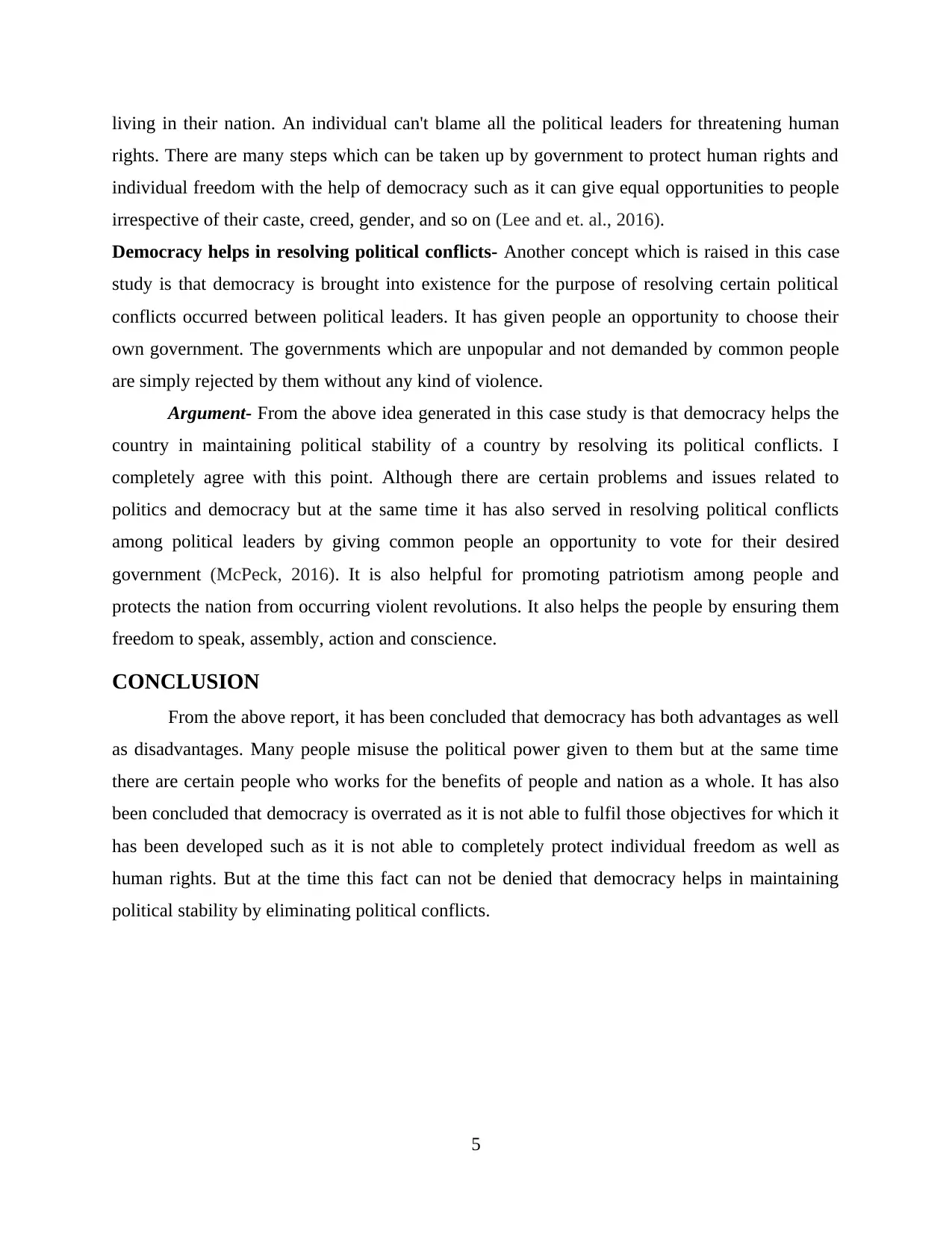
living in their nation. An individual can't blame all the political leaders for threatening human
rights. There are many steps which can be taken up by government to protect human rights and
individual freedom with the help of democracy such as it can give equal opportunities to people
irrespective of their caste, creed, gender, and so on (Lee and et. al., 2016).
Democracy helps in resolving political conflicts- Another concept which is raised in this case
study is that democracy is brought into existence for the purpose of resolving certain political
conflicts occurred between political leaders. It has given people an opportunity to choose their
own government. The governments which are unpopular and not demanded by common people
are simply rejected by them without any kind of violence.
Argument- From the above idea generated in this case study is that democracy helps the
country in maintaining political stability of a country by resolving its political conflicts. I
completely agree with this point. Although there are certain problems and issues related to
politics and democracy but at the same time it has also served in resolving political conflicts
among political leaders by giving common people an opportunity to vote for their desired
government (McPeck, 2016). It is also helpful for promoting patriotism among people and
protects the nation from occurring violent revolutions. It also helps the people by ensuring them
freedom to speak, assembly, action and conscience.
CONCLUSION
From the above report, it has been concluded that democracy has both advantages as well
as disadvantages. Many people misuse the political power given to them but at the same time
there are certain people who works for the benefits of people and nation as a whole. It has also
been concluded that democracy is overrated as it is not able to fulfil those objectives for which it
has been developed such as it is not able to completely protect individual freedom as well as
human rights. But at the time this fact can not be denied that democracy helps in maintaining
political stability by eliminating political conflicts.
5
rights. There are many steps which can be taken up by government to protect human rights and
individual freedom with the help of democracy such as it can give equal opportunities to people
irrespective of their caste, creed, gender, and so on (Lee and et. al., 2016).
Democracy helps in resolving political conflicts- Another concept which is raised in this case
study is that democracy is brought into existence for the purpose of resolving certain political
conflicts occurred between political leaders. It has given people an opportunity to choose their
own government. The governments which are unpopular and not demanded by common people
are simply rejected by them without any kind of violence.
Argument- From the above idea generated in this case study is that democracy helps the
country in maintaining political stability of a country by resolving its political conflicts. I
completely agree with this point. Although there are certain problems and issues related to
politics and democracy but at the same time it has also served in resolving political conflicts
among political leaders by giving common people an opportunity to vote for their desired
government (McPeck, 2016). It is also helpful for promoting patriotism among people and
protects the nation from occurring violent revolutions. It also helps the people by ensuring them
freedom to speak, assembly, action and conscience.
CONCLUSION
From the above report, it has been concluded that democracy has both advantages as well
as disadvantages. Many people misuse the political power given to them but at the same time
there are certain people who works for the benefits of people and nation as a whole. It has also
been concluded that democracy is overrated as it is not able to fulfil those objectives for which it
has been developed such as it is not able to completely protect individual freedom as well as
human rights. But at the time this fact can not be denied that democracy helps in maintaining
political stability by eliminating political conflicts.
5
Paraphrase This Document
Need a fresh take? Get an instant paraphrase of this document with our AI Paraphraser
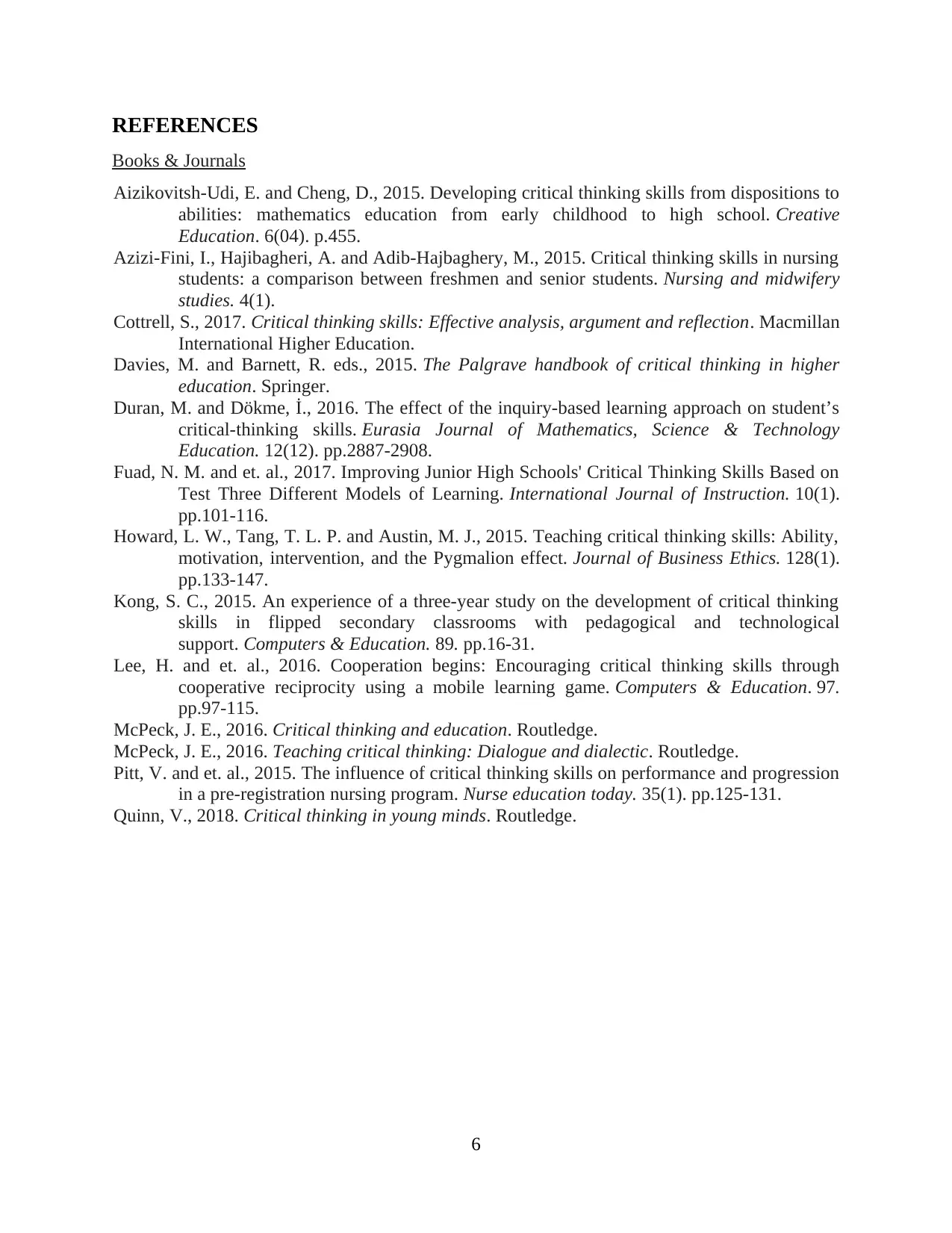
REFERENCES
Books & Journals
Aizikovitsh-Udi, E. and Cheng, D., 2015. Developing critical thinking skills from dispositions to
abilities: mathematics education from early childhood to high school. Creative
Education. 6(04). p.455.
Azizi-Fini, I., Hajibagheri, A. and Adib-Hajbaghery, M., 2015. Critical thinking skills in nursing
students: a comparison between freshmen and senior students. Nursing and midwifery
studies. 4(1).
Cottrell, S., 2017. Critical thinking skills: Effective analysis, argument and reflection. Macmillan
International Higher Education.
Davies, M. and Barnett, R. eds., 2015. The Palgrave handbook of critical thinking in higher
education. Springer.
Duran, M. and Dökme, İ., 2016. The effect of the inquiry-based learning approach on student’s
critical-thinking skills. Eurasia Journal of Mathematics, Science & Technology
Education. 12(12). pp.2887-2908.
Fuad, N. M. and et. al., 2017. Improving Junior High Schools' Critical Thinking Skills Based on
Test Three Different Models of Learning. International Journal of Instruction. 10(1).
pp.101-116.
Howard, L. W., Tang, T. L. P. and Austin, M. J., 2015. Teaching critical thinking skills: Ability,
motivation, intervention, and the Pygmalion effect. Journal of Business Ethics. 128(1).
pp.133-147.
Kong, S. C., 2015. An experience of a three-year study on the development of critical thinking
skills in flipped secondary classrooms with pedagogical and technological
support. Computers & Education. 89. pp.16-31.
Lee, H. and et. al., 2016. Cooperation begins: Encouraging critical thinking skills through
cooperative reciprocity using a mobile learning game. Computers & Education. 97.
pp.97-115.
McPeck, J. E., 2016. Critical thinking and education. Routledge.
McPeck, J. E., 2016. Teaching critical thinking: Dialogue and dialectic. Routledge.
Pitt, V. and et. al., 2015. The influence of critical thinking skills on performance and progression
in a pre-registration nursing program. Nurse education today. 35(1). pp.125-131.
Quinn, V., 2018. Critical thinking in young minds. Routledge.
6
Books & Journals
Aizikovitsh-Udi, E. and Cheng, D., 2015. Developing critical thinking skills from dispositions to
abilities: mathematics education from early childhood to high school. Creative
Education. 6(04). p.455.
Azizi-Fini, I., Hajibagheri, A. and Adib-Hajbaghery, M., 2015. Critical thinking skills in nursing
students: a comparison between freshmen and senior students. Nursing and midwifery
studies. 4(1).
Cottrell, S., 2017. Critical thinking skills: Effective analysis, argument and reflection. Macmillan
International Higher Education.
Davies, M. and Barnett, R. eds., 2015. The Palgrave handbook of critical thinking in higher
education. Springer.
Duran, M. and Dökme, İ., 2016. The effect of the inquiry-based learning approach on student’s
critical-thinking skills. Eurasia Journal of Mathematics, Science & Technology
Education. 12(12). pp.2887-2908.
Fuad, N. M. and et. al., 2017. Improving Junior High Schools' Critical Thinking Skills Based on
Test Three Different Models of Learning. International Journal of Instruction. 10(1).
pp.101-116.
Howard, L. W., Tang, T. L. P. and Austin, M. J., 2015. Teaching critical thinking skills: Ability,
motivation, intervention, and the Pygmalion effect. Journal of Business Ethics. 128(1).
pp.133-147.
Kong, S. C., 2015. An experience of a three-year study on the development of critical thinking
skills in flipped secondary classrooms with pedagogical and technological
support. Computers & Education. 89. pp.16-31.
Lee, H. and et. al., 2016. Cooperation begins: Encouraging critical thinking skills through
cooperative reciprocity using a mobile learning game. Computers & Education. 97.
pp.97-115.
McPeck, J. E., 2016. Critical thinking and education. Routledge.
McPeck, J. E., 2016. Teaching critical thinking: Dialogue and dialectic. Routledge.
Pitt, V. and et. al., 2015. The influence of critical thinking skills on performance and progression
in a pre-registration nursing program. Nurse education today. 35(1). pp.125-131.
Quinn, V., 2018. Critical thinking in young minds. Routledge.
6
1 out of 8
Related Documents
Your All-in-One AI-Powered Toolkit for Academic Success.
+13062052269
info@desklib.com
Available 24*7 on WhatsApp / Email
![[object Object]](/_next/static/media/star-bottom.7253800d.svg)
Unlock your academic potential
Copyright © 2020–2025 A2Z Services. All Rights Reserved. Developed and managed by ZUCOL.





